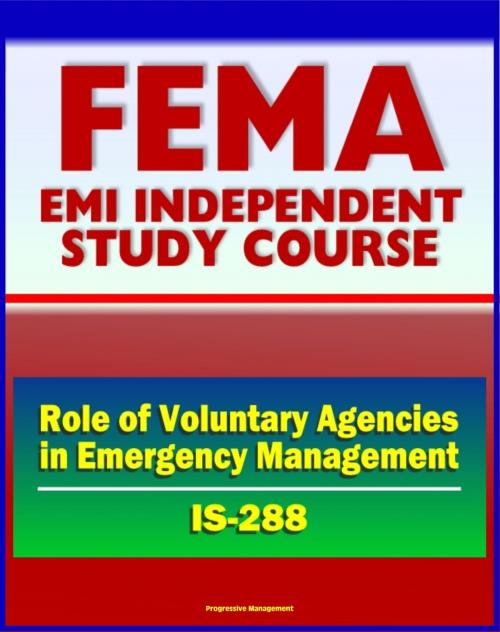21st Century FEMA Study Course: The Role of Voluntary Agencies in Emergency Management (IS-288) - NVOAD National Voluntary Organizations Active in Disaster
Nonfiction, Social & Cultural Studies, Political Science| Author: | Progressive Management | ISBN: | 9781465705457 |
| Publisher: | Progressive Management | Publication: | July 7, 2011 |
| Imprint: | Smashwords Edition | Language: | English |
| Author: | Progressive Management |
| ISBN: | 9781465705457 |
| Publisher: | Progressive Management |
| Publication: | July 7, 2011 |
| Imprint: | Smashwords Edition |
| Language: | English |
This Federal Emergency Management Agency (FEMA) independent training course manual from the Emergency Management Institute (EMI) is provides a basic understanding of the history, roles, and services of disaster relief voluntary agencies in providing disaster assistance. It is appropriate for both the general public and those involved in emergency management operations.
The overall goal of this Independent Study course is to increase awareness of the roles and responsibilities of voluntary agencies in emergency management. Voluntary agencies have helped meet the needs of individuals and communities affected by disasters since the 1800’s. Today, they serve a critical role in the emergency management field from helping communities prepare for and mitigate the effects of disasters to providing immediate response and long-term recovery services. Without the support, dedication, and expertise of voluntary agencies, the government would be unable to address all the needs of disaster-affected communities.
At the conclusion of this course, participants should be able to:
-
Describe the unique strengths that voluntary agencies bring to the emergency management community;
-
Identify important historical milestones in the development of voluntary agencies in the U.S.;
-
Describe briefly the history of each National Voluntary Organizations Active in Disaster (NVOAD) member agency;
-
Identify the roles and services that voluntary agencies provide throughout each phase of the emergency management cycle (i.e., mitigation, preparedness, response, and recovery);
-
Explain the importance of collaboration and coordination among voluntary agencies and between voluntary agencies and their emergency management partners; and
-
Describe the entities (e.g., National Voluntary Organization Active in Disaster, the Donations Coordination Team) that foster government/voluntary agency coordination throughout the emergency management cycle.
This is a privately authored news service and educational publication of Progressive Management.
This Federal Emergency Management Agency (FEMA) independent training course manual from the Emergency Management Institute (EMI) is provides a basic understanding of the history, roles, and services of disaster relief voluntary agencies in providing disaster assistance. It is appropriate for both the general public and those involved in emergency management operations.
The overall goal of this Independent Study course is to increase awareness of the roles and responsibilities of voluntary agencies in emergency management. Voluntary agencies have helped meet the needs of individuals and communities affected by disasters since the 1800’s. Today, they serve a critical role in the emergency management field from helping communities prepare for and mitigate the effects of disasters to providing immediate response and long-term recovery services. Without the support, dedication, and expertise of voluntary agencies, the government would be unable to address all the needs of disaster-affected communities.
At the conclusion of this course, participants should be able to:
-
Describe the unique strengths that voluntary agencies bring to the emergency management community;
-
Identify important historical milestones in the development of voluntary agencies in the U.S.;
-
Describe briefly the history of each National Voluntary Organizations Active in Disaster (NVOAD) member agency;
-
Identify the roles and services that voluntary agencies provide throughout each phase of the emergency management cycle (i.e., mitigation, preparedness, response, and recovery);
-
Explain the importance of collaboration and coordination among voluntary agencies and between voluntary agencies and their emergency management partners; and
-
Describe the entities (e.g., National Voluntary Organization Active in Disaster, the Donations Coordination Team) that foster government/voluntary agency coordination throughout the emergency management cycle.
This is a privately authored news service and educational publication of Progressive Management.















